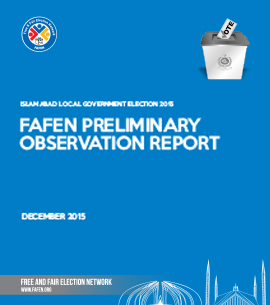People in Islamabad Capital Territory went to the polls to elect their local representatives for the first ever local government on November 30, 2015 in a well-managed election that remained peaceful but were characterized by irregularities that continue to prevail due to weaker mechanisms for the enforcement of electoral laws and rules on Election Day, says FAFEN Preliminary Observation Report on Islamabad Local Government Election 2015.
The government decision to not declare November 30, 2015 as a public holiday, unlike other districts where LG election were held, was controversial and might have kept many people from voting.
Considering the smaller scale of the election, the Election Commission of Pakistan (ECP) utilized Geographical Information System (GIS) for voters to locate their polling stations via live Google Maps through a dedicated application on its website. This is a step forwards towards electoral transparency that needs acknowledgement. Moreover, the polling scheme was made public much ahead of the election schedule. The ECP’s plans to use android technology to capture the images of polling station results from 200 polling stations also needs appreciation and should be seen as its willingness to take major steps towards electoral transparency. However, such measures need to be perfected ahead of General Election 2018 for their introduction throughout the country.
Despite several positives, FAFEN observers documented 743 illegalities and irregularities of various natures at 148 observed polling stations, reinforcing the need for greater powers and authority for the ECP to hold the erring officials accountable. On an average, at least five violations were reported from each polling station from where information was received on Election Day, which is almost similar to the scale of issues documented in the first two phases of the local government elections in Punjab and Sindh provinces. However, the ECP monitoring was observed to have improved in Islamabad. Presiding officers at 43 percent of observed polling station reported that any representative of ECP or the Returning Officer had visited through the day for monitoring the quality of the polling process. This percentage was around 30% in the second phase of local government elections in Sindh and Punjab.
Among persistent and glaring illegalities were campaigning and canvassing by political parties and candidates outside polling stations in complete disregard to the legal provision that bars them from such activity within a 200 meters radius of a polling place. Observers reported party camps setup outside 34 percent of observed polling stations, most of which were being used to persuade voters. Voters were reported to have been given slips of their serial numbers on electoral rolls by political parties and candidates at nearly 80 percent of the observed polling stations. Polling officials, despite instructions, were also reported to have been asking the voters to produce the slips as it makes their work easier to locate a voter on the electoral list.
To download complete report, click here



